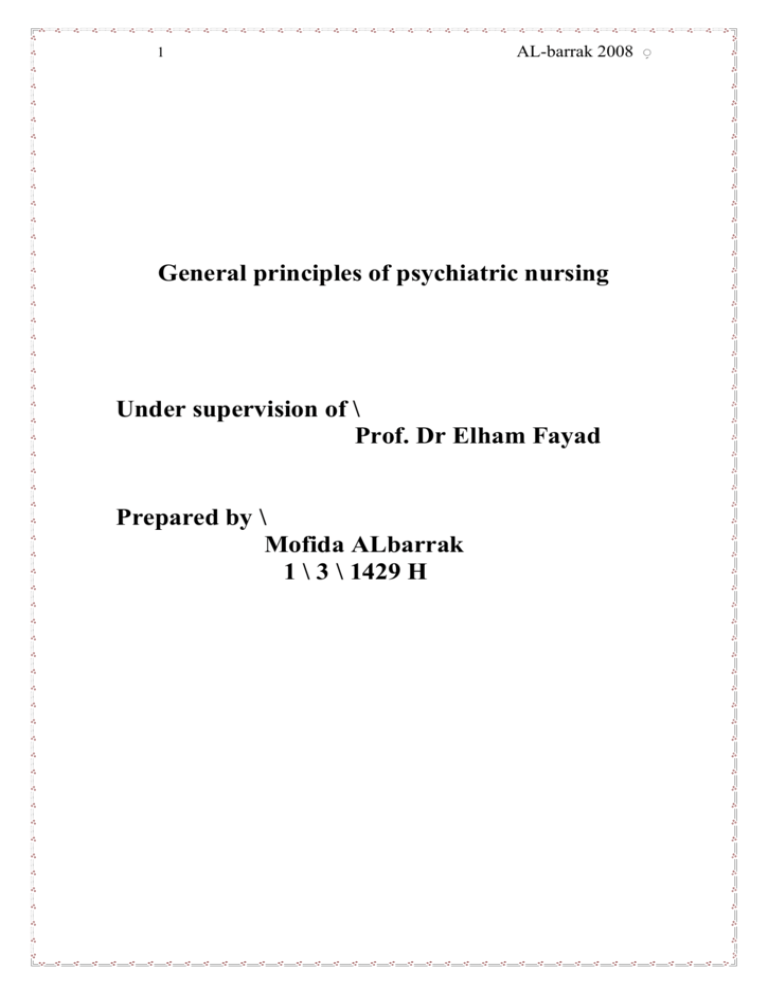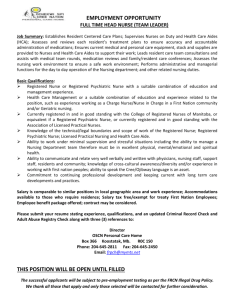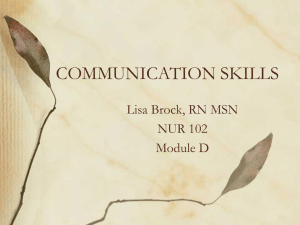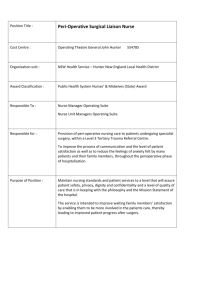Psychiatric Nursing Principles: A Comprehensive Guide
advertisement

1 AL-barrak 2008 ِ General principles of psychiatric nursing Under supervision of \ Prof. Dr Elham Fayad Prepared by \ Mofida ALbarrak 1 \ 3 \ 1429 H 2 AL-barrak 2008 ِ General principles of psychiatric nursing Objectives At the end of my lecturer the audience will be able to:1. Discuss general principles of psychiatric nursing. 2. Applied the application of these principles Introduction The following are general principles that apply to the care of all who show behavior disorders- mental ill as well as physically ill is usually associated with emotional disturbance to some degree. These principles are based on the concept that each individual has basic needs, the right for value, dignity, & the potential to grow. 3 AL-barrak 2008 ِ Out line List 12 principles of psychiatric nursing 1. Patient should be accepted as he is 2. Self understanding is used to as a therapeutic tool. 3. Consistency is used to contribute to patient's security 4. Reassurance to be given in a suitable & acceptable manner. 5. Patient's behavior is changed through emotional experience, by rational interpretation. 6. Unnecessary increase in patient's anxiety should be avoided. 7. Observation of mentally ill patient is directed toward of behavior. 8. Maintain a professional relationship. 9. Verbal & physical force must be avoided if possible 10. Nursing care centered on patient as a person, not on control of symptoms. 11. Routine & procedures explained at patient's level of understanding. 12. Many procedures are modified but basic principles remain unaffected. AL-barrak 2008 ِ 4 1. Patient should be accepted exactly as she is. a - Be non-judgemental and nonpunitive. b- Show interest in the patient as a person c- Recognize and reflect on feelings which the patient express. d- Talk with a purpose. e- Allow patient to express strongly held feelings. Acceptance conveys the feeling of being loved cared for. Acceptance provides the patient with an experience which is emotionally neutral, where she finds unlearning of her sick behaviour less threatening. Acceptance does not mean complete permissiveness but acceptance means setting of positive behaviours to convey to her respect as an individual human being. Acceptance is shown in the following ways:a - Be non-judgemental and non-punitive. We don't judge patient's behaviour as right or wrong, good or bad. Patient is not punished for her undesired behaviour. 5 AL-barrak 2008 ِ All direct & indirect methods of punishing must be avoided. b- Show interest in the patient as a person by: 1. Studying patients' behaviour pattern 2. Making the patient aware that you are interested in her. 3. Seeking out a patient 4. Using time spent with her on these things she is interested in 5. Being aware of her likes & dislikes 6. Avoiding subject on which she feels sensitive 7. Listening to her. 8. Explain when her demands cannot be met. 9. Accepting her fears as real to her. c- Recognize and reflect on feelings which the patient express. The nurse develops skill in identifying the feeling actually expressed. d- Talk with a purpose. Conversation with a patient must have a goal. Nurse's conversation with a patient must go around her needs, wants & interests. Indirect approaches like *reflection, *open-end questions, *focusing on point AL-barrak 2008 ِ 6 Avoid evaluative, hostile, probing responses & use the understanding responses which may help the patient to explore her feelings. e- Allow patient to express strongly held feelings. It is better to permit the patient to express her strong Feelings without disapproval feeling of anxiety, fear, hostility, hatred or anger should be expected, tolerated and Allowedexpressions. Expression of these negative feelings may be encouraged in verbal or symbolic manner. 2. Self understanding is used to as a therapeutic tool. How can nurse understand herself better? 1- Exchange personal experience freely and openly with colleagues. 2- Discuss your personal reaction with an experienced person. 3- Participate in group conference regarding patient care. 4- Keeping reflecting on Why one feels or acts the way you do. Self understanding leads to understanding of others when an individual is aware of why she behaves as she does; it helps her to understand the behaviour of persons with whom she relates. Patient’s behaviour can produce a lot of anxiety, or fear in the nurse and she must be understand why she is anxious or frightened in order to be able to handle the patient. AL-barrak 2008 ِ 7 3. Consistency is used to contribute to patient's security a. Why consistency? b. Areas where consistency must operate. c. How should consistency operate? a. Why consistency? Not knowing what to expect, or fear of the unknown produces anxiety. Patient must feel that she can depend on the people working in the ward. b. Areas where consistency must operate. 1. Attitudes of the staff 2. Ward routine 3. Defining the limitation placed on the patient c. How should consistency operate? 1. patient to be continuously exposed to an atmosphere of acceptance 2. consistence to be maintained from nurse & shift to shift 3. Permissiveness to be limited e.g. with patients who are homicidal, suicidal, hyperactive & suspicious. AL-barrak 2008 ِ 8 4. patient is allowed to fell as she does but limitations are put on his behavior 5. Limit & its reinforcement requires a great deal of tact & understanding, & should be done in a quiet & matter of fact way. 6. The attempt to win patients' liking (favoritism) is most dangerous for the patient. 4. Reassurance to be given in a suitable & acceptable manner. a. Reassurance b. Avoid saying to the patient c. How to give reassurance? a. Reassurance Reassurance is building patient's confidence b. Avoid saying to the patient 1. You will get well 2. Your fears have no base 3. You are a nice person 4. All will end well 5. Nothing to worry 9 AL-barrak 2008 ِ c. How to give reassurance? 1. Be truly interested in patient problems. 2. Pay attention to the matters that are important to the patient, however insignificant it may be. 3. Allow her to be as sick as she needs to be. 4. Be aware & accept how the patient really feels 5. Do things for the patient without asking anything of the patient in return, 6. Sit beside patient even when she does not want to talk. 7. Listen to personal problems without showing surprise or disapproval. 8. Agree that the patient has a problem and think along with her to solve it. 9. Provide patient acceptable outlets of anxiety. 10 AL-barrak 2008 ِ 5. patient's behavior is changed through emotional experience, by rational interpretation. 1. Major focus is on felling aspect & not on intellectual aspect. 2. Patients' defensive behavior against anxiety producing stress is based on strong emotional needs 3. The more beliefs are challenged, the more the patient becomes defensive. 4. Corrective emotional experience can bring about behavior change. 5. Help the patient feel emotionally secure to enable her to develop & use understanding of her own behavior. 6. Understanding cannot be forced. Insight & understanding of ones own behavior is painful. 7. Interpretation is only done when patient is ready for it, i.e. secure enough to tolerate it & able to apple it to alter her behavior. 8. Attitudes are also not identified for the patient, when she is ready to tolerate, them she will identify them herself. AL-barrak 2008 ِ 11 6. Unnecessary increase in patient's anxiety should be avoided a. What is anxiety? b. What factors, situation, topics or approaches can increase anxiety? a. What is anxiety? It is a threat to biological integrity of the self system (ego) of the person. b. What factors, situation, topics or approaches can increase anxiety? This may differ from patient to patient, but some general types of situations which increase anxiety are 123456789- Direct contradiction of patient's psychotic ideas. Demands on patient which she obviously cannot meet Failure. Indiscriminate use of professional terms. Insincerity. Calling attention to patient's defects. Threats, sharp command, & indifference Lack of proper orientation Nurse's own anxiety. 12 AL-barrak 2008 ِ 7. Observation of mentally ill patient is directed toward of behavior. a. Why - Every thing the patient does or says is observed & analysed, to seek its motivation & to understand what she is trying to accomplish. - Asking you self what is the goal of the patient care? Why did she behave the way she did? Objectivity is an essential component of observation. b. What do we mean by objectivity? Objectivity is an ability to evaluate exactly what a patient wants to say & not mix up your own feeling, opinion, or judgment. Objectivity is not coldness, indifference, & absence of feeling, but it is an ability not to let your own judgment get confused with emotional warmth. How can you be objective? One important way is to keep indulging in introspection, make sure that your own emotional needs don't come first before patients needs. Maintain an objective attitude in the care of patients 13 AL-barrak 2008 ِ Indications of lack of objectivity in nurse’s observation When? 1- Nurse is critical to the patient. 2- Defending or justifying herself. 3- Demanding that patient should treat her in a certain way. 4- Evaluating patient’s behaviour as right or wrong. 5. Nurse needs to be honest with her. N.B. Self understanding can help the care provider to be more objective. 8. Maintain a professional relationship. 1. A professional relationship focuses upon the personal and emotional needs of the patient and not on nurse's needs. Such a relationship is therapeutically oriented & is always based on patient's needs. 2. Nurse keeps analysing the interaction between herself & the patient to prepare herself to guide the patient towards mature behaviour. 3. Nurse must differentiate between patient's demands & actual needs. 14 AL-barrak 2008 ِ 9. Verbal & physical force must be avoided if possible Any kind of force applied on patient results in psychological trauma. If the nurse is knowledgeable in predicting patient's behavior, she can prevent an onset of undesirable behavior. If force needs to be used. 1. Carry out the procedure quickly, firmly & efficiently with adequate help. 2. Anger or annoyance should not be shown. 3. No verbal comments should be made during the procedure, except to tell the patient. 4. Never let the patient feel that she is being punished, attend to her needs as usual. 5. Never remind the patient again about the incidence. 6. Nursing team must have self-control & understanding in carrying out the procedure. AL-barrak 2008 ِ 15 10. Nursing care centered on patient as a person, not on control of symptoms. Every behavior \ symptom is meaningful. Two patients showing the same symptom may be expressing different needs. Analysis and study of symptoms are necessary to reveal their meaning and their significance to the patient. 11. Routine & procedures explained at patient's level of understanding. - Every patient has a right to known what is being done & why it is being done. -every procedure should be explained at her level of understanding. 12. Many procedures are modified but basic principles remain unaffected For example Enema, surgical dressing, catheterization & given medication 16 AL-barrak 2008 ِ Summary Teaching principles of psychiatric nursing is an essential component in preparing nursing students. The pervious part outlines & discusses the importance & application of these principles. Reference Townsend. Maryc. (2003) Psychiatric Mental Health nursing concepts of care fourth edition, F.A. Davis Company









